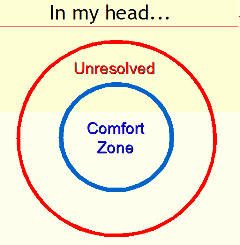Saturday, October 01, 2005
Don’t stop what you're doing
In the 1920s, Bluma Zeigarnik watched a waiter taking orders in a Viennese café. The waiter could remember an elaborate order until he had delivered it, after which it vanished from memory. Zeigarnik hypothesized that people remember things that are not finished because they maintain a tension in the mind awaiting closure. Ultimately Zeigarnik proved that people remembered unfinished tasks about twice as well as completed ones.
Thus, if an instructor wants students to remember a presentation, she will end the class in mid-sentence, before drawing a final conclusion. Direct marketers use the Zeigarnik effect to whet their readers’ interest. To remember the book you’re reading, take a break in mid-chapter, not at a more natural stopping point. If you want to keep something actively in mind, don’t close it out. Let it hang.
Zone out
Exercise fanatics want to be “in the zone.” If you want to learn a lot, you’ll choose to be out of the zone. The comfort zone, that is. You can’t learn what you already know, so to maximize learning, you need to get out of your routines and encounter new and different things.
 Your comfort zone contains what you know. You can’t learn what’s in there because you already have. For the moment, those chapters are closed. This is stuff you now take for granted. It’s the storehouse of patterns of thought you use to make sense of the world.
Your comfort zone contains what you know. You can’t learn what’s in there because you already have. For the moment, those chapters are closed. This is stuff you now take for granted. It’s the storehouse of patterns of thought you use to make sense of the world.Other patterns in your head are less comforting. They are unresolved. Perhaps they are new and under evaluation. Maybe, like the orders for coffee, they are still in play, awaiting closure. Perhaps they are thought experiments (Einstein’s Gedankenexperimenten) such as what-if scenarios and imaginary prototypes. Sometimes they are things that “don’t add up,” i.e. they don’t mesh with the patterns in the comfort zone.
 Learning takes place in your unresolved zone. Uncertainly engages the mind. Could ambiguity be the root of learning? Or at least an accelerant?
Learning takes place in your unresolved zone. Uncertainly engages the mind. Could ambiguity be the root of learning? Or at least an accelerant?Are people driven to learn because we seek to perceive things as fitting our existing worldview? Is Attention Deficit Disorder fueled by the excitement of rarely closing everything? Does the Zeigarnik effect making multitasking possible? Can a lack of closure on too many fronts drive you crazy? Does it make sense for me to try to write the conclusion to my book rather than ending it abruptly in mid-sentence? Is it worth half a million
More to come...











11 Comments:
you are definitely on to something very important here
Nice going, Jay.
You've set the "hook". I already am thinking more about what you wrote (so far) than if you had given it to me all at once.
Analogous to ambiguity as the root of learning, do you think that seeking internal conflict resolution could be the root of informal learning?
In a formal learning environment, such as a child being taught about Rosa Parks in his History class, if he doesn't care about Rosa Parks, little learning will occur, regardless of how we try to classify it.
If, however, he becomes fascinated by Rosa Parks, he will develop questions about her in his own mind, creating a state of internal conflict for which he will then go to outside resources, whether peers, family, teachers, blogs, wikis, whatever, to try to resolve this conflict.
In an ideal informal learning cycle, he will resolve this conflict and subsequently receive a new mental challenge, it could be internally or externally motivated, 'Why did Rosa Parks not sit in the back of the bus?' for which he will then go seek out answers to resolve this new state of internal conflict.
Successful video games depend on this cycle by allowing players to reach a certain level, then presenting a new challenge that encourages the learner to find the resources to pass it, but that isn't so challenging as to be impossible.
My fundamental life-changing conclusion about informal learning is that the value is
In a nutshell, yes. The mind's quest to have things make sense is incredibly powerful. Ever hear of the work of Solomon Asch in the 50s? Drawn on a piece of paper are four lines. One of the lines is obviously shorter than the others. The paper is passed around a group. The first seven people (who are in on it) say the lines are all the same length. About half the time, the eighth person will agree that the lines are all the same. Half of those in agreement aren't just following the crowd--fMRI scans show that they actually see lines of equal length.
Learning as bringing the patterns in memory into alignment. I'll have to think on that. The answer might be in
Intriguing. The fMRI scans suggest that learning is entirely context dependent, but that context can actually skew the knowledge that is transferred - not only to the extent of what a learner perceives he is learning but in what he has biologically determined as fact.
I'm not sure if this helps me to distinguish between informal and formal learning (my focus).
My theory is that new forms of digital media have made the information seeking process independent to the need for a sense of community or social networks from which to seek the information because a learner can go directly to technology sources to resolve any internal coflicts he has. I'm not convinced that learning is bringing the patterns in memory into alignment. I would argue that patterns in memory are there because the patterns have already been learned at some point. Maybe there is some additional learning going on as the mind is seeking to make sense of things, but more learning occurs during the initial process of incorporating those patterns into memory, through whatever means it is done. \
Although, on second thought, I'm not sure about this last sentence. Maybe the 'real' learning is in fact the sense-making process, not the knowledge acquisition. Hmmm. What do you think?
Making sense using memory patterns strongly correlates to informal learning in context of
PS
I'm curious, based on your research, would you agree that the 'best' informal learners are the people who are the most successful in life?
Formal learners get A's in elementary school but overall success (and I'm not going to attempt to define that term) is more strongly correlated with informal learning?
Success is defined as
From Tom Davenport's latest, Thinking for a Living, pp 144-45. "Interestingly, we found little correlation between traditional measures of expertise (e.g., education, tenure, and self-rated expertise) and high performance. To be sure, lack of expertise predicted poor performance (i.e., bottom 20 percent), but expertise alone did not consistently distinguish high performers. Rather, as I'll describe below, it seemed that high performers were more intentional, flexible, and proactive learners over time."
"...our interviews suggested high-performing knowledge workers were effective and efficient experiential learners."
Howard, I think another mechanism takes hold after a while: habituation.The mind tires of excitement and can get used to anything.
This is related to how humor works. A funny story is 1-2-3-4-5. You give the audience 1-2-3-5.
The punch line is ...
It's funny because ...
hint: "He who raff rast had to have yolk esprained." - Confusedus
David Lynch movies have this property that they ALMOST make sense, and you can spend a lot of time trying to make the peices fit together. Maybe for many people, that is why they are interesting.
Perhaps that is the property that you are really looking for? You provide something that plugs into people's existing context enough so that the narrative creation function of the mind is engaged, but cannot arrive at an unambiguous completion (you can inject some cognitive dissonance in there as well to make the narrative completion process harder). What this means is that you can't just drop some half-completed pseudo-narrative on people that doesn't fit into an existing context, and you can't leave so little that there isn't the tantalizing complete narrative that is just outside of reach.
For informal/formal learning anonymous, the interesting question isn't the existence of an internal conflict, but what causes that conflict to arise in some people and not others. That is the source of the motivation to pursue more information - observing that some people are more motivated than others to learn doesn't go far enough - I think you have to identify how to engage this motivation, if your goal is to promote learning.
This comment has been removed by a blog administrator.
Post a Comment
<< Home